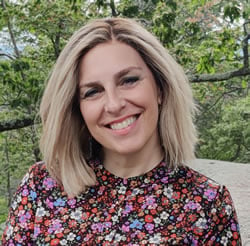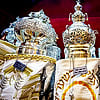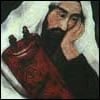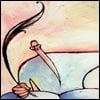This is the story of a very special Sefer Torah (Torah Scroll), purchased shortly after the Second World War by my maternal zeide (grandfather), Rabbi Pinchas Sudak, when he and his family were on their dangerous trek escaping Communist Russia.
Unlike most Jews living under the Communist Soviet regime, Zeidy Pinchas did not really lack for anything. He had an underground knitting factory and was a relatively wealthy man. He also managed to sustain a Jewish, Torah-observant life for himself and his family. When he escaped from Russia in the summer of 1946, at the age of thirty-eight, it was not because of any material or even spiritual need. On the contrary, Zeidy Pinchas risked being shot at the border for trying to escape. Nor did he do it for the spiritual future of his children. He did it for his grandchildren.
My mother, Batsheva — the oldest of Zeidy Pinchas' three children — grew up in a home where commitment to Yiddishkeit was a way of life. As a young girl she would ride alone on a donkey for several miles through the desert to bring home the necessary wheat to be later grinded and prepared under exacting supervision for the Passover matzah. That was her task because, as a child, she was not as subject to questioning by the authorities.
Nor was it an unusual sight in my mother's home for music books to be swiftly spread over the piano as soon as a stranger entered their home, hiding the religious books nesting beneath. In this way, my mother was able to pursue her Jewish studies with her "piano teacher."
Zeidy Pinchas recognized that his children, raised to fight for the preservation of their faith, would gain inordinate strength and faith to persevere in following the path of their tradition — no matter what the circumstances. "I am not leaving Russia for my own children," he said. "They will always know that they are Jews and will remain loyal to their faith. But what will become of my children's children? That I do not know. It is for them that I must leave the clutches of this regime."
Fortunate to have crossed the Russian border alive, the Sudak family found themselves in Cracow with a group of forty-six other Lubavitcher Chassidim escaping the Stalinist dictatorship, with their final destination unknown. Included in this group was the Lubavitcher Rebbe's mother, Rebbetzin Chana Schneerson.
There, in Cracow, Zaidy Pinchas met a Polish Jew who was offering a Torah scroll for sale, and resolved immediately to purchase the Torah. He then had a heavy wooden box fashioned to carry and protect it.
"Wherever this journey may lead us," said Zaidy Pinchas, "how can so large a group of Jews travel without a Sefer Torah in their midst?"
It was time for the group to move onwards, walking through Steczen, to cross the Czechoslovakian border on their way to Prague. They left late at night. Each could carry only their most basic necessities; all other worldly possessions were abandoned. Zeidy Pinchas had diamonds sewn into the soles of his family's shoes.
In the blackness of the night, Zeidy Pinchas and Batya Sudak and their three children, each grasping a coarse rope to keep them together, trekked silently through a dense forest. Zeidy Pinchas clutched his beloved Sefer Torah as he marched behind Bubby Batya, who carried their youngest child, Bracha. As time progressed, Bubby Batya grew weary and motioned to her husband that she could no longer carry Bracha.
With tears in his eyes, Zaidy Pinchas took his Sefer Torah out of its wooden case, and silently mouthed an apology. "My priceless Torah, you know that it is for you that I have left Russia. I would not have left to an unknown future for myself. Nor for my children. I am fleeing to ensure that my children's children will know you and live with you. Forgive me, dear Torah, for betraying you now. It is either you or my child. I part with you now, so that my children and children's children should live a life where you are a real and meaningful part."
Zaidy embraced the Torah for the last time and gently laid it, in its case, under a tree. He lifted his young child in his arms and journeyed forward.
Eventually, Zaidy Pinchas and his family reached the free shores of Israel. His children, Batsheva, Nachman and Bracha, each grew up to become Rabbis or Rebbetzins serving their respective communities and promulgating faith in Torah.
A few years ago, my mother, Rebbetzin Batsheva Schochet, was visiting in California where she was invited to the home of Mrs. Faigy Estulin, a friend of my sister's. Faigy was describing her own father's exodus from Russia — several weeks after my grandparents' escape — and attributed his longevity and robust health to an incident that happened over more than 50 years ago.
He and his wife were escaping Russia on a dark night. Along the way, their five year old daughter wandered away from them and was momentarily lost. Frantically, the parents searched for her, crawling on their hands and knees through the forest.
Suddenly Rabbi Gurevitch felt a hard surface. Upon further investigation, he opened a wooden box to discover a Sefer Torah. Next to the wooden box sat his young child. Kissing both passionately, he took the Torah from its box, unraveled it and wrapped it around his body, tying it with his gartel (prayer belt). Eventually, that Torah scroll made its way to its current home, in a shul in New York City.
Mrs. Estulin ended by crediting her grandfather's long and healthy life to the merit of this significant act.
Concluding her story, she looked up at my mother and couldn't fathom why my mother's face had gone completely ashen and tears were streaming from her eyes.
The legacy of Zaidy's precious Sefer Torah had come full circle.








Join the Discussion